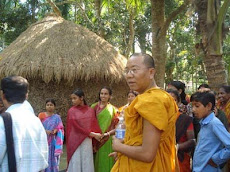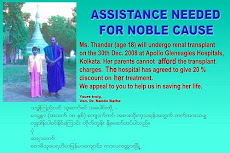How religion has assisted people living with HiV/AIDS
Honorable Consul General, respected ladies and gentle men; I am very happy to be with you here, and I am very much grateful to Mr. Rafique Anwar, Program Manager, and all organisers of this meeting who have invited me to be here. I am Nando Batha, representing Russa Road Young Buddhist Student Literacy Mission, having its head Office at Barasat.
Regarding "how religion has assisted people living with HIV/AIDS, I would like to express my view here, especially how Buddhist religion offers help to those suffering from HIV/AIDS. It is no doubt religion has assisted people in many ways. Religion has assisted the people not only living with HIV/AIDS, but also living with many depressions. Now-a-day our lives become so stressful, because of heavy work pressure, because of environmental and social problems and so on. We have to try so hard to survive in this world. Science still cannot give any answer to meet all these challenges posted in front of our human society. Religion may be the only one which can solve all sort of problems.
According to Buddhism, death is definitely not a subject to be avoided. Instead it is the key to unlocking the apparent mystery of life. Siddhartha Gautama renounced his comfortable princely life to seek the end of suffering, not just for himself, but for all. We are encouraged to consider old age, sickness, and death, not in general terms, but in a very personal way, mentally reciting this daily reflection: I am of the nature to age. I have not got beyond aging. I am of the nature to sicken. I have not got beyond illness. I am of the nature to die. I have not got beyond death. I will be separated from everyone and everything that is dear to me.
I am born of my kamma, heir of my kamma, abide supported by my kamma and of that which I do, of that I will be the heir.
AIDS is a true pandemic, with a cure still a long way off, and its prognosis, sooner or later, death. In that sense, AIDS has been called the “illness of all illnesses.” Still, the thoughtful Buddhist sees that we are all under a sentence of death. Death, by illness, by accident, or by another’s hand, comes inevitably along with birth. Thus, AIDS is still just another graphic proof of the suffering intrinsic to existence. If the Buddha’s lesson is wisely applied, the person with AIDS, as well as the rest of us, can contemplate death, thus weakening its threat and finding comfort, strength, and support in understanding what AIDS and death really mean. Essentially, AIDS is no different from tsunamis and earthquakes. Like all other phenomena and other diseases, AIDS develops only within the complex and natural set of causes and conditions. Thus Buddhism offers to those with HIV/AIDS, acceptance and compassion without discrimination.
Buddhism wholeheartedly agrees with the principles of the Universal Declaration of Human Rights, as formulated in article 25, paragraph 1:
“Everyone has the right to a standard of living adequate for the health and well-being of himself and of his family, including … medical care and necessary social services, and the right to security in the event of … sickness … .
According to Buddhism Kamma, also called the Law of Cause and Effect, determines why one succumbs to infection, while another does not. Under the law of Kamma, each person gets what he has created for himself. Each one's life, with its particular share of joys and sorrows, is neither more nor less than the result of his own past actions, good and bad. Each person is the architect of his own fortune. In kamma, we find the root cause of death. We also know that no arbitrary power fashions this kamma according to its will or caprice. It is the result of our own actions. As we sow, so shall we reap. We must understand, though, that kamma is not something generated in the “closed box” of the past. It is always in the making. By our words and deeds, at every moment, we are contributing to it. Hence, the future is not conditioned only by the past. It is constantly being conditioned by the present. This is the great optimism of the Buddha’s teaching. In a sense, we are all of us under a sentence of death, but an HIV/AIDS diagnosis means that the patient can’t pretend otherwise, can’t delude himself with the illusion of immortality. How a person reacts, though, creates the conditions for his future. If we fear our death sentence, we should understand that all other living things instinctively react as we do as well. Reflecting on our fears, it should naturally follow that we develop compassion for others, because we are in the same situation. Meditating on death means that we reflect that it is the common lot of all living things. Furthermore, if we reflect sufficiently on death, we should feel the urgent need to make wise use of the present, so as to ensure a happy future. Buddha talked about this urgency “as if one’s turban were on fire!” Certainly if the turban wrapped around your head were flaming, you wouldn’t be daydreaming or wasting time! Our religion gives us useful tools to face living and dying. We know that the person who leads a virtuous life, harming none, living open-handed, being generous and compassionate, helping whom he can, living in conformity with the Dhamma, and always remembering the Dhamma, is without doubt laying the foundation of a happy future life. Dhammo have rakkhati dhamma carim The Dhamma most assuredly protects him who lives in harmony with it. Such harmony is encouraged by the contemplation of death. The fear of death subsides for one who knows that he is doing good and avoiding evil.
Buddha gave us a number of techniques for purifying our minds. For someone who has been diagnosed HIV positive, one of the most useful is to practice loving-kindness, or metta. The HIV/AIDS patient may, at first, feel great shock, or even anger, but metta meditation begins by being kind and friendly to oneself. In metta meditation, we must begin by wishing that we ourselves be well, free from anger and hatred, free from greed and envy, free from fear and grief, free from disease and pain. We pervade ourselves with peacefulness. This practice means no reproaches, no pernicious self-hate, no painful what-ifs. We must wish ourselves happiness now, suffusing ourselves with calm and well-being. When we have succeeded in being kind to ourselves, we proceed to spreading friendliness and loving-kindness to those close to us, then to those who are strangers, and finally to those who may wish us ill. Metta is beneficial to all of us and may be especially useful to someone dealing with AIDS. Greater meditation leads to an increase in wisdom. Thus, bad can be changed into good. A careless, or even a cruel, person can become a mindful and good person. One who is good is always happy. He has no fear of death because he has no fear of the life beyond. The powerful changes that good deeds and meditation bring about in this life will also ensure, after death, the rebirth of a more fortunate being. This means that the person who has practiced diligently can face a good death, without fear, confident in a good next birth. Buddha taught us to meditate on death, carefully and systematically, in order to weaken our infatuation with sense-pleasures, to reduce our vanity, and to give us perspective. We should all reflect that "death will take place," “death will come to me,” lest we be heedless. Mindfulness of death purifies and refines the mind. It also can rob death of its terror. It will help, at that moment when one is gasping for the last breath, to face that situation with courage. Contemplating death relieves fear. It teaches us to live with proper values, and it enables us to die a good death with fortitude and calm,
Thus Religion has assisted people living with HIV/AIDS, and Religion will continue to help the people living with HIV/AIDS in the century that will follow.
Thank you all so much.
(The paper presented and read out at The American Information Resource Center, Calcutta, on 29/12/05 by Ven. Dr. Nando Batha, Vice President, Russa Road Young Buddhist Student Literacy Mission, P.O. Badu, P.S. Barasat, 24 Parganas (N), Kolkata 700128, West Bengal, India. The title of program is "The role of religious leaders and faith-based organizations in the fight against HIV/AIDS"))






1 comment:
urgently in need of Female Eggs with the sum of $500,000.00,Email: jainhospitalcare@gmail.com
Watsap: +91 8754313748
urgently in need of Female Eggs with the sum of $500,000.00,Email: jainhospitalcare@gmail.com
Watsap: +91 8754313748
urgently in need of Female Eggs with the sum of $500,000.00,Email: jainhospitalcare@gmail.com
Watsap: +91 8754313748
urgently in need of Female Eggs with the sum of $500,000.00,Email: jainhospitalcare@gmail.com
Watsap: +91 8754313748
urgently in need of Female Eggs with the sum of $500,000.00,Email: jainhospitalcare@gmail.com
Watsap: +91 8754313748
urgently in need of Female Eggs with the sum of $500,000.00,Email: jainhospitalcare@gmail.com
Watsap: +91 8754313748
urgently in need of Female Eggs with the sum of $500,000.00,Email: jainhospitalcare@gmail.com
Watsap: +91 8754313748
urgently in need of Female Eggs with the sum of $500,000.00,Email: jainhospitalcare@gmail.com
Watsap: +91 8754313748
urgently in need of Female Eggs with the sum of $500,000.00,Email: jainhospitalcare@gmail.com
Watsap: +91 8754313748
urgently in need of Female Eggs with the sum of $500,000.00,Email: jainhospitalcare@gmail.com
Watsap: +91 8754313748
urgently in need of Female Eggs with the sum of $500,000.00,Email: jainhospitalcare@gmail.com
Watsap: +91 8754313748
Post a Comment